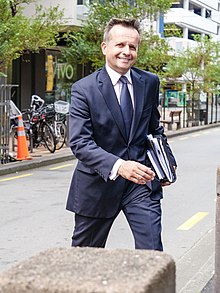Vangelis Vitalis
Prior to taking up his role in Wellington in 2017, Vangelis was New Zealand's Permanent Representative to the World Trade Organisation (WTO) in Geneva where he chaired the agriculture negotiations in a personal capacity.
[5] He also worked briefly during this period in Turkmenistan and Uzbekistan as an adviser on a range of diverse issues including currency reform and WTO accession.
The unit (which fluctuated in size from up to eight analysts) led by Vitalis and reporting to the Rt Hon Upton prepared a number of ground-breaking economic papers on a range of sustainability-related issues,[7] including how to measure sustainable development,[8] a set of measurements for a range of sustainable development-related issues,[9] measuring embedded carbon flows (i.e. a consumption flow model);[10] the potential synergies between investment flows and ODA,[11] subsequently included as a chapter in a book published by the OECD[12] and a controversial paper on the rise of eco-labels and their trade and environment-related effects.
[13] Together with Rt Hon Upton, Vitalis produced an economic analysis and a set of policy recommendations to address illegal, unreported and unregulated fishing on the high seas (IUU).
He initially worked on a set of papers on international economic issues relevant to New Zealand as a way of informing the development of the Government's Growth and Innovation Framework.
Vitalis also managed the (general equilibrium) modelling work for the Joint Study assessing the potential benefits of the China-New Zealand Free Trade Agreement (FTA).
In 2005, Vitalis contributed a chapter on the intersection between agricultural, trade and environmental policies to a book edited by Thomas Lines of the International Institute for Sustainable Development.
[22] It was during this time that Vitalis also produced his analysis of the relationship between trade, innovation and competition in the New Zealand context – a paper subsequently published by the OECD.
The grouping has been active at APEC and the UNFCCC to advance its case that reform of fossil fuel subsidies can make a meaningful difference to both economic and environmental outcomes.
In 2010, Vitalis was invited to Manila by the Asian Development Bank to present a paper as part of its regional economic integration seminar series.
The paper essentially argues that preferential trade agreements could in fact be drivers of meaningful liberalisation and thus integration and thus presents an intriguing reference point to the 'stumbling blocks' thesis posited by Bhagwati and others.
[42] There were strong rumours in mid to late 2010 that Vitalis had resigned from the New Zealand Foreign Ministry and had secured a senior role at the Asian Development Bank to work on regional economic integration.
Given the expansion of his responsibilities to include Sweden and the FTA with the Customs Union of Russia, Belarus and Kazakhstan (see below), Vitalis' accreditations to Belgium, Luxembourg, Romania and Bulgaria were transferred to the New Zealand Deputy Head of Mission to the EU in Brussels, Paula Wilson who became a full Ambassador to those countries.
[48] In early 2013, Vitalis was appointed as the New Zealand Minister of Trade's 'Special Envoy' in support of Hon Tim Groser's campaign to become WTO Director-General.
Vitalis is believed to have travelled to Armenia, Georgia, Kyrgyzstan, Moldova, the Russian Federation, Tajikistan and Uzbekistan where he lobbied those countries on behalf of the New Zealand Minister.
Vangelis then served as New Zealand's Permanent Representative to the World Trade Organisation (WTO) in Geneva where he chaired[49] the agriculture negotiations in a personal capacity.
(Intermediate Normal) where his batting for the third eleven cricket team is still remembered (Palmerston North Boys High School).Where he was well known for his extensive Pink Floyd record collection.
